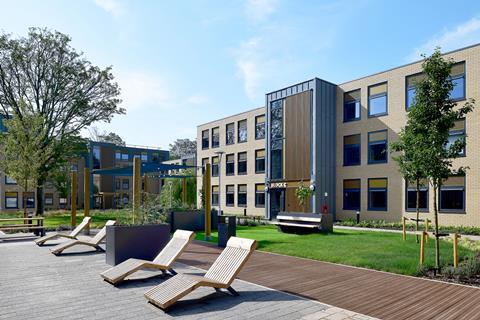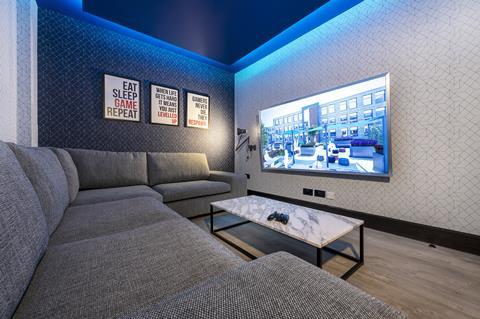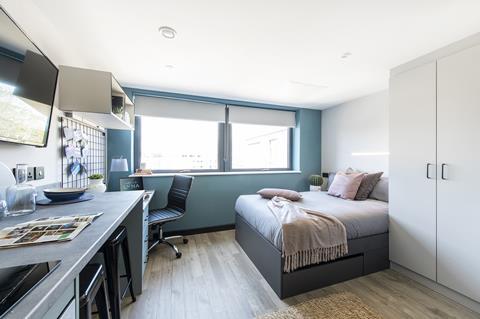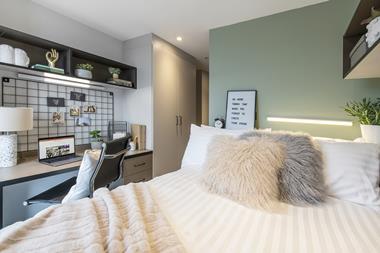CRM Students’ motto as an operator of student halls is to put residents at the heart of everything. Its chief executive officer Richard Skeels tells Property Week the future of PBSA is set to change in the wake of the pandemic, which has shifted students’ priorities when seeking accommodation.

The student accommodation sector in the UK is on the cusp of an evolution. As the market has matured over the years, so have the people in it, becoming experts in providing high-quality housing for students.
But no one saw the pandemic coming, not least Richard Skeels, who recently assumed the role of chief executive officer at PBSA operator CRM Students. He believes now the world has changed, so will PBSA.
Skeels says the demographic mix of domestic and international students will have an impact on how student accommodation will be marketed. “Probably 45% plus is the normal make-up of international students, and Chinese students are by far the biggest proportion of that, followed by India,” he says.
But the pandemic has made it harder for those students to come, with borders closed and direct flights few and far between. “People didn’t know if it was even safe to come,” he adds. “They were certainly cautious about coming here.”
Asian students also have more options these days, Skeels says, as universities on the continent climb their way up the Top 200 Universities list every year.
“There is a bit of me that thinks if it continues to be harder to come to the UK and the experience at university within Asia is a good one, would they want to come to the UK if there are options closer to home?”

He maintains that students in the Asia Pacific region are still drawn to UK higher education, but the biggest demographic change the sector has seen is down to Brexit.
“European student numbers coming to the UK are down about 35%. It’s interesting, having gone through a pandemic that Brexit has probably ended up making Europeans think: ‘Should I be coming to the UK?’”
Coupled with UCAS reporting an 8% rise in the number of applications from domestic UK students, operators like CRM Students have a challenge on their hands in terms of marketing its rooms.
“Domestic students probably have a different budget and want something slightly different from some of our international students. I think that shift affects the market as the product remains the same, but what does the customer want?”
Online learning
Skeels is resolute that the events of the past 19 months have cemented the view that the university experience is a “rite of passage” for young people.
The appeal of university education has also been driven by the lessening appeal of other options such as apprenticeships or the mass job vacancies seen in the UK. “I think people see a degree is the better way to go,” he says.

Of course, the university experience was not all plain sailing for the students who had enrolled in 2019, not knowing a global pandemic was coming. Skeels says he empathised with students who felt shortchanged from paying tuition fees and accommodation fees for online learning.
“Obviously, in lockdown there was a lot of concern about what that experience was as universities went online. Students and parents were saying: ‘I’m paying a lot of money to do this online. If I’m doing it from home, or I’m doing it in front of a screen, is that the right experience?’ We should not underestimate the financial commitments parents and students are giving,” he says.
The story of what university life looks like has changed now; it has switched to fewer large, in-person lectures and more face-to-face learning in smaller groups. Now the industry has a responsibility to provide the right services to accommodate students.
“Universities are getting the right story out there that says blended learning can be a good way,” Skeels says. “As long as universities can get the execution right, I think the learning and the experience can be beneficial, plus it gives students flexibility.”
The shift to more online learning has meant students are spending the bulk of their time in their student accommodation, which has made CRM Students rethink what facilities they have on-site to cater for study and social spaces.
“It’s ramped up what we give them as a service, both by way of human contact and physical facilities.”
Skeels say the main lesson CRM Students has learned is what facilities it can provide to meet its customers’ needs.
“In the early days of the pandemic, there was talk that people wouldn’t want to be in a cluster and everyone would want studios. But people want that sociability and want to be part of a community with their group of friends. We need to offer different things and this was the starting point.”

Skeels adds that its customer offer depends on the city it operates in, the demographic of students in that city and what customers have said they want from student accommodation.
“I’d hesitate to say it’s one size fits all. Part of what we do in terms of working with clients is looking at the scheme and the profile of students in that city or that property.
“We have some sites and cities that have a higher international student occupancy who may have a different wish for facilities, or some schemes that have more postgraduate students. We will work with the demographic and go from there.”
Future opportunities
Skeels is pretty bullish about the future of the market, especially about the supply demand ratio.
“If you went back about four or five years, the number of beds available in the UK stood at around two students to one bed,” he says. “That includes university accommodation, PBSA and HMOs. Here we are five years on, and that figure now stands at one and a half students to one bed, so I guess it makes the marketplace more competitive.”
ESG and green credentials are the top focus for CRM Students and it is having conversations with its landlord clients on existing sites and making its voice heard at early stages of new schemes.
“As we’re not an owner, we try and get involved with architects and developers at the earliest stage possible to consult on design and the credentials in terms of what that building will look like going forward.”
The operator does have control over which utilities companies it works with and how to enact green policies from developers.
“I think developers understand and make sure in terms of carbon neutrality that we work very hard as an operator to make sure we do our piece on that, by way of working with suppliers that can help us be carbon neutral or green.

“We chose one of the central contracts we have specifically for its green credentials, its approach to ESG and ethically sourced utilities are now supplied to our sites.”
The biggest challenges for CRM Students and the sector this year and the next is the working relationship between PBSA operators and universities to address the shortfall in quality housing for students.
“Working hand in hand with the universities continues to be a very big part of the future of the industry,” Skeels says. “The universities have had huge challenges this year. We’ve seen York University having to put students in Hull, and people studying in Bristol having to be in Bath.
“I think even down in Weymouth, there was a story of students camping because there wasn’t room at the university.
“I know at times it’s often built up as PBSA against university halls. I don’t see it that way. There’s room for both.
“This is still a crucial time in terms of working with the universities hand in hand because, my view is it’s got to be student centric. It’s about making sure that all students can have access to accommodation that they want.”































No comments yet